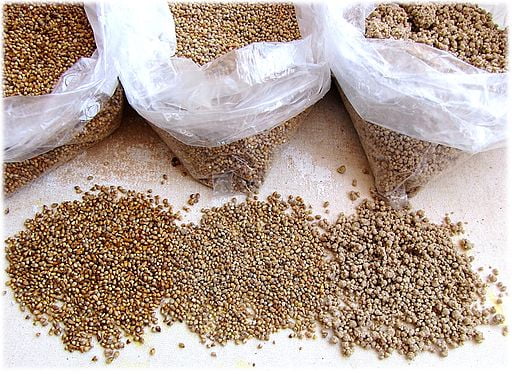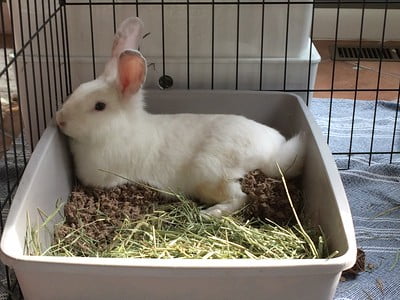Last Updated on March 18, 2023 by Marjon Ramos
The signs that a rabbit is depressed are when they lack appetite, over-or not grooming, lethargy, aggression, pacing, seclusion, and tense posture.
The most common reasons rabbits get depressed are: small cages, not enough exercise, boredom, lack of social interactions, death of a companion, and if your rabbit is sick or is in pain.
Now that I’ve given you the gist of the article, read on as I discuss those reasons in detail and what to do about them:
Table of Contents
Signs of sad or depressed rabbits
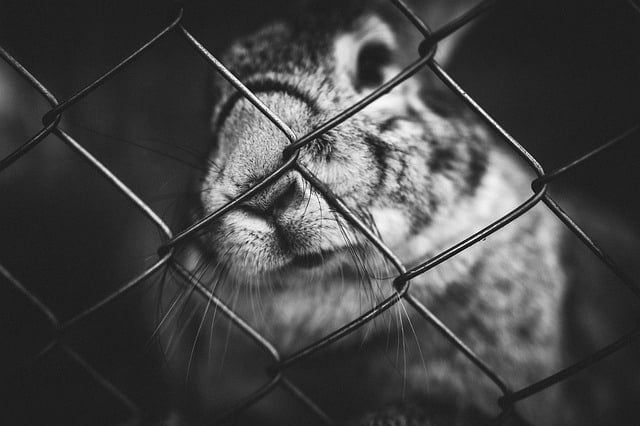
Rabbits’ being depressed is one of the most detrimental and often dangerous conditions a rabbit could have.
Depressed rabbits often develop dangerous habits like not eating. This in turn could lead to GI stasis, which is dangerous to rabbits if not treated.
That’s why depression should be taken seriously by rabbit owners. It’s up to us to make their lives as happy and comfortable as we can.
Here are the most common signs that your rabbit might be depressed:
Lack of appetite
Rabbits, being grazers, would not stop eating suddenly or have a low appetite for no reason.
Their stomach relies on them to eat in order to induce movement.
Without constant eating, their GI tract could stop moving, which could lead to death if not treated.
If you notice that your rabbit is not eating the same amount of food every day, you should take that seriously and do anything you can to fix it.
You should also go to a veterinarian and get proper advice on how to handle it.
Overgrooming or not grooming
Rabbits are meticulous cleaners and will spend a significant amount of time grooming themselves.
However, when your rabbit starts to overgroom to the point where you notice patches of hair are missing, your rabbit might be frustrated, stressed, or depressed.
In contrast, not grooming is also a sign of depression in rabbits.
As I said, rabbits are meticulous cleaners. If you notice that your rabbit is not grooming themselves, find out what’s making them unhappy and improve their living conditions.
Lethargy
Rabbits in the wild are naturally energetic creatures and will spend hours exploring, playing, and running around looking for food.
If you notice that your rabbit is suddenly lethargic, bring them to a veterinarian to make sure that everything is fine.
After your veterinarian cleared your rabbit for anything serious, improve your rabbits’ living conditions and allow them to spend hours exercising and playing.
Aggressiveness
Are you noticing that your rabbit is suddenly aggressive towards you or other rabbits?
Is your rabbit suddenly displaying destructive behaviors towards things around your house or it’s cage?
Depressed rabbits often show signs of frustration and channel those emotions by biting either you or the things around your house.
Pacing
Depressed rabbits would often pace back and forth inside their cage.
This behavior is usually caused by a small cage or a lack of exercise.
Seclusion
Rabbits are naturally social and like to explore their environment.
Depressed rabbits would often shut themselves out by hiding in their cages or somewhere dark.
Tensed posture
A rabbit that’s normal and relaxed would stretch itself out whenever it’s resting.
The opposite is true for depressed rabbits.
They would have tense body language and would sit hunched, almost as if they were cautious of you.
Reasons why rabbits get depressed

Small cage
The most common reason rabbits get depressed is small cages.
Rabbits in the wild spend their days exploring and grazing.
They have the whole forest to explore and wonder through.
If you confine a rabbit in a small cage for long periods of time without giving them enough exercise, there’s a high chance that your rabbit will get depressed sooner or later.
Lack of social interactions.
Another reason why rabbits get depressed is when they don’t have enough social interaction with either you, their owner, or, preferably, another rabbit.
Boredom
Rabbits require lots of stimuli to be happy as pets.
Make sure that you’re keeping your rabbits busy by providing toys.
The best way to make a rabbit happy is to simulate what they do in the wild.
In pain or sick rabbit.
Rabbits who are in pain or sick often show all the signs of depression, like tense body language, secluding themselves, aggression, lethargy, and lack of appetite.
That’s why it’s always a good idea to bring your rabbit to a veterinarian whenever you notice any changes in their behavior.
Death of a companion
The death of a companion rabbit could also trigger depression in rabbits if you don’t allow them to grieve properly.
Oftentimes, when one of the pairs gets sick and they die in the veterinarian’s office, most owners will leave the body there without letting the other rabbit grieve properly.
As morbid as it sounds, you need to show the dead body of the deceased rabbit to the other rabbit in order for them to properly process what happened.
You need to leave the body for at least 4 hours before disposing of it.
What to do if your rabbit is depressed?
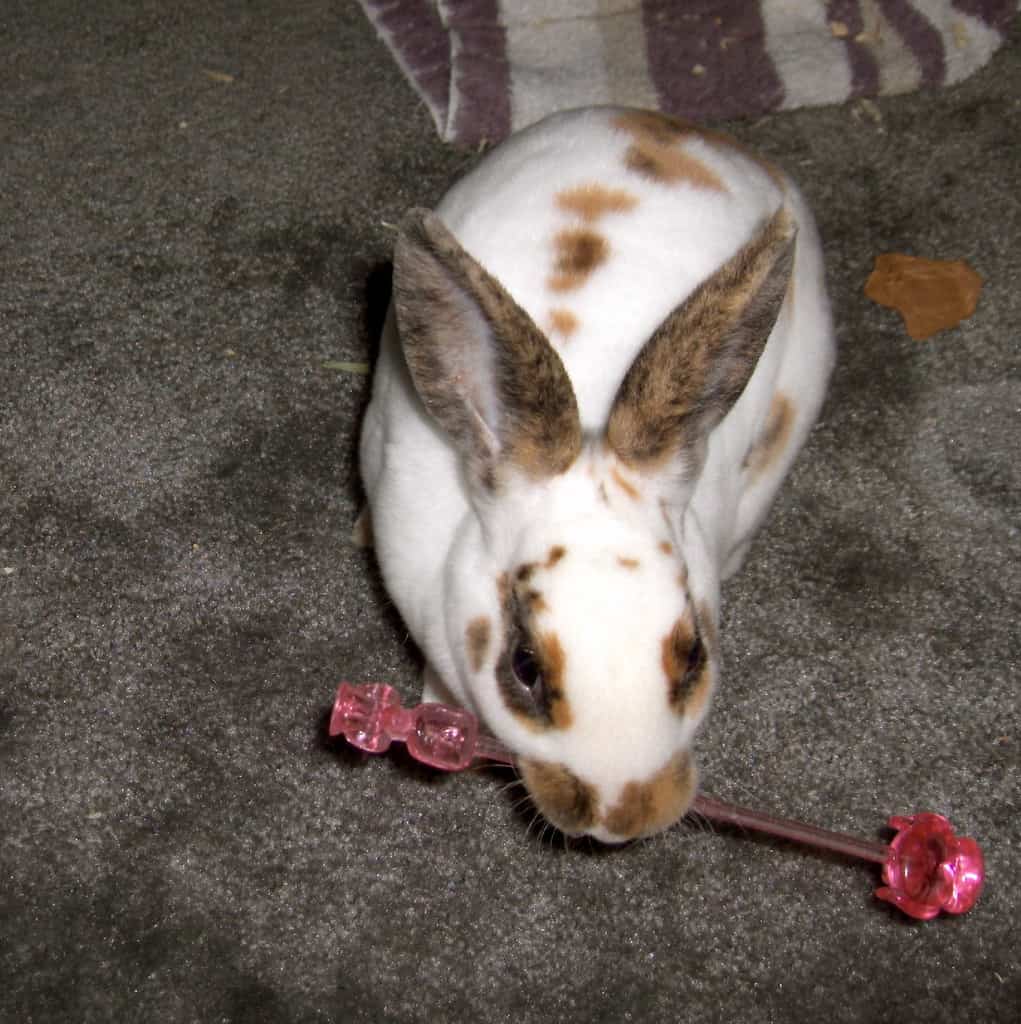
The first thing you should always do when you notice any odd behavior is to bring your rabbit to a veterinarian.
Your rabbit might be suffering from certain conditions that need medical help.
Trying to solve the problem without a veterinarian’s clearance is risky.
Most of the symptoms of depression in rabbits can also be a symptoms of rabbits that are suffering from medical problems.
Here are some of the things you can do to help with your rabbit’s depression:
Provide toys.
As I said earlier, rabbits that are bored will often get depressed.
Unlike wild rabbits who are getting a lot of stimuli from nature, pet rabbits are often confined in small cages and lack the required stimuli.
Best toys for rabbits to help with depression:
- Willow balls
- Willow bridge
- Willow sticks
- Wooden dumbbells
- Twig Tunnels
- Ka-Bob Chew Dispenser Toy
- Toilet paper rolls
Improve living conditions.
Improving your rabbit’s living conditions means taking a good look at the way they’re currently living.
Is their cage/hutch size appropriate and big enough for them?
Do they have access to food and water whenever they want?
Is their cage clean?
Is your rabbit getting enough exercise?
Get your rabbit a companion or second rabbit.
Another thing you can do to improve your rabbit’s mood is to get another rabbit as their companion.
This is especially important for rabbit owners who are always at work.
Rabbits require social interaction in order to be happy.
Consider getting your rabbit a companion if you won’t be able to give it to him/her yourself.
Give your rabbit time to exercise.
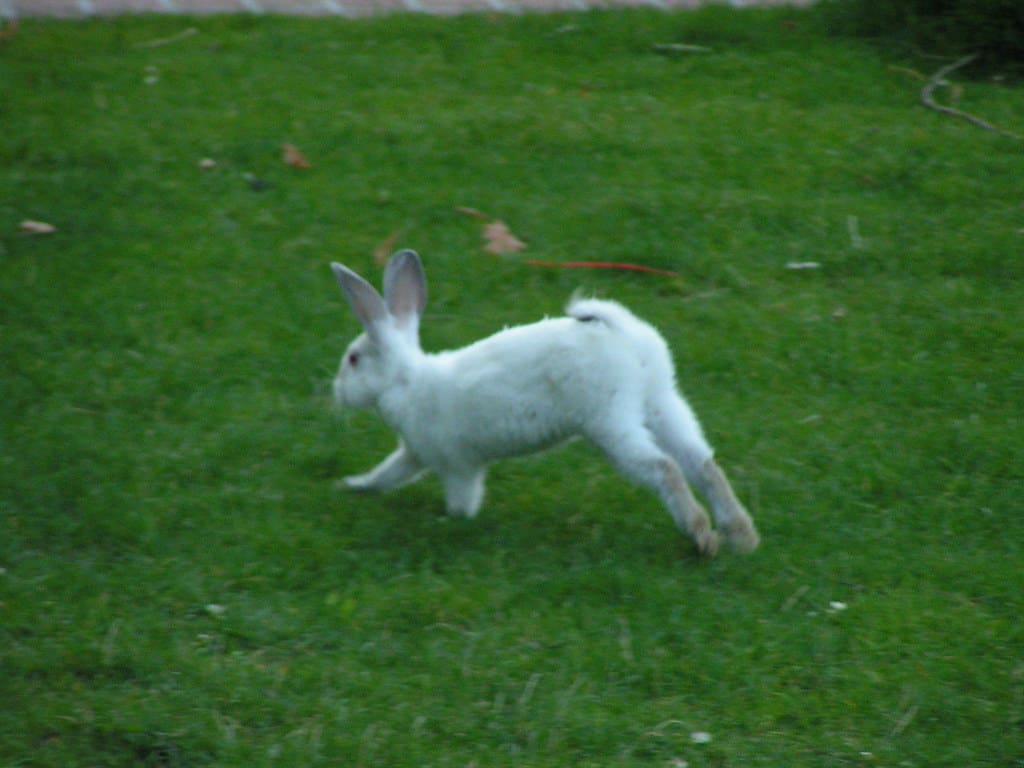
Rabbits are not meant to be kept in small cages all day.
In the wild, rabbits would spend their days running around looking for food and avoiding predators.
Give your rabbits at least four hours of exercise each day.
Conclusion
The best way for pet rabbits to be happy and healthy is to mimic what they do and have in the wild.
Rabbits need social interaction, enough exercise, and lots of stimuli in order to be happy.
Confining a rabbit in a small cage for long periods of time with little to no social interaction would cause severe depression.
Depression in rabbits is dangerous when they stop eating.
Rabbits that are not eating would eventually lead to conditions like GI stasis, which in turn could lead to death.
Cite this article:
Related Articles
- Can Rabbits Eat Asparagus? 9 things you need to know.
- Can Rabbits Eat Tomatoes? What You Need To Know.
- Can Rabbits Eat Watermelon? What You Need To Know.
- Can Rabbits Eat Grapes? What You Need To Know.
- Can Rabbits Eat Broccoli? What You Need To Know.
- Can Rabbits Eat Apples? What You Need To Know.
- Can Rabbits Eat Cabbages? What You Need To Know.
- Can Rabbits Eat Strawberries? What You Need To Know.
- Can Rabbits Eat Bananas? What You Need To Know.
- Can Rabbits Eat Oranges? 9 things you need to know.
- Can Rabbits Eat Blueberries? Here’s Why.
- Can Rabbits Eat Spinach? Your Questions Answered.
- Can Rabbits Eat Cucumbers? Here’s Why.
- Can Rabbits Eat Celery? What you need to know.
- Can Rabbits Eat Radishes: Everything You Need To Know
Sources and further reading
- Patry, Karen, et al. The Rabbit-Raising Problem Solver: Your Questions Answered about Housing, Feeding, Behavior, Health Care, Breeding, and Kindling. Storey Publishing, 2014.
- Understanding the Basics of Rabbit Care
- Basic Rabbit Care
- Rabbit Basics for the Beginner
- The importance of diet in rabbits

